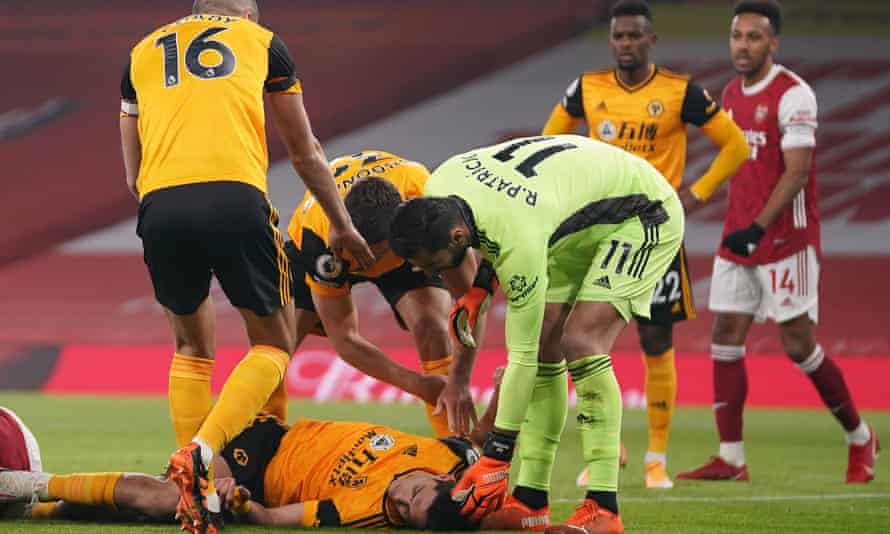The clear streets glitter in the quiet day. A cold wind haunts the silent underpass. Between Asda and the Mary Seacole Building, crows pick unmolested at drifting litter. People came here once, in the ancient times, the memory of their thronging presence echoing through the concourses and the aisles of a deserted Molineux.
The betting booths have not been touched since the crisis broke. On the Coral whiteboard, ghostly traces linger of a bygone civilisation. “First goalscorer v Brighton, 7 March,” one reads, “JIMENEZ 5/2, JOTA 4/1, NETO 6/1, DOHERTY 8/1, NEVES 11/1.” Expert opinion is divided on what these enigmatic markings could signify. A price-list of some kind? An incantation, perhaps, to the gods of commerce this lost people seem to have worshipped? Others see in that inscription a prophecy of doom.
Matt Doherty scored four Premier League goals last season and has since been sold. Diego Jota scored seven and has since been sold. Raúl Jiménez scored 17 league goals last season, but fractured his skull in his 10th league game of this campaign and will not be back for some time. Between them they were responsible for 70% of Wolves’ league goals last season. Lose that, and it’s hardly surprising if they have looked toothless recently. Jiménez has not played since November, but remains joint top-scorer.

Wolves at least beat Arsenal on Tuesday and so face Leicester on Sunday having ended a run of eight games without a win. That was a necessary victory, lifting them 12 points clear of the relegation zone, but it was not a performance to kindle much optimism. Wolves were scratchy and hesitant, uncomfortable with a back four, and were comprehensively outplayed before David Luiz’s unfortunate intervention. Hoping your opponents have two players sent off and gift you a penalty and that you then get another goal with a 25-yard wonder-strike is not a reliable recipe for sustained success.
For the first time since Wolves were promoted in 2018, Nuno Espírito Santo seems to have come to doubt his method. In all 38 games of each of their first two seasons back in the Premier League and the first eight games of this season, Wolves played with a back three. Like many of the sides who were still involved in European competition in August, they started slowly, but they took 10 points from four games in October before a narrow defeat to Leicester.
Then Conor Coady and Romain Saïss tested positive for Covid. Without two of his first-choice central defenders, Nuno changed and deployed a back four against Southampton the following Monday. They drew that match 1-1, then won at Arsenal, the game in which Jiménez was injured.
Wolves have played 12 league games since. In seven of them, including against Arsenal, Nuno has used a back four: they have yielded an average of 0.71 points per game, with 1.29 goals for and 2.14 against. In the other five, Wolves have played with a back three: they have yielded 0.80 points per game, with 0.60 goals for and 1.00 goals against. With a back three they are solid but cannot score; with a back four they are more creative but also far less secure.
Which isn’t much of a choice at all. It isn’t quite so simple as that, of course, and that is an extremely small sample size, but what was clear on Tuesday was just how uncomfortable Wolves’ full-backs in particular are in a back four. In the first half Max Kilman and Nélson Semedo never got to grips with Bukayo Saka and Nicolas Pépé.
And that hints at a deeper question. What are Wolves? What are they for? The links between the agent Jorge Mendes and the club have been cause of concern since the takeover by the Chinese company Fosun International in 2016 but, until now, Wolves have benefited from the relationship, which has brought an influx of Portuguese talent. This is the first time players have left without being adequately replaced.

To an extent, that’s a matter of misfortune. Semedo, after all, has 17 caps and arrived from Barcelona. Perhaps a £27.6m fee was a little high, but he is 27, at his notional peak, and it was not unreasonable to think he would be a useful addition at right wing-back. His struggles have been highlighted by Adama Traoré’s loss of form, which has also compounded the lack of attacking potency by denying Wolves their least predictable creator, a player capable of generating chances from nowhere.
Fábio Silva, signed from Porto for £37m, meanwhile, looks an excellent prospect. He is physically imposing and skilful, and took his goal against West Brom with an icy self-assurance. But he is 18, and would surely not have been exposed so frequently had it not been for Jiménez’s absence. The January loan signing of Willian José as short-term cover for Jiménez makes complete sense.
There has been much talk recently of Wolves’ supposed timorousness, and perhaps a decline in confidence has made them increasingly risk-averse. But Wolves have always been a cautious team under Nuno, thrilling on the break but based on the maintenance of a solid defensive shape. Only four sides conceded fewer goals than them in the Premier League last season.
Sign up to The Recap, our weekly email of editors’ picks
Wolves’ style of play, even with the change of shape, has not fundamentally changed. Shots per game, shots conceded per game, possession and pass success rates are all essentially unaltered from last season. What has changed is how many of those chances have been taken and, since the start of the experiment with the back four, how many goals Wolves are conceding. Which, frankly, sounds a lot like a team losing their main goal threats suffering a crisis of belief and beginning to tamper with a method that had brought success.
That’s not to say, necessarily, that a return to the back three is essential. Sometimes, whether because of personnel or staleness, teams need to evolve. But it is to say that with a centre-forward and a more reliable option on the right side of defence, everything could look very different.
from Football | The Guardian https://ift.tt/3jrK47S
via IFTTT

No Comment